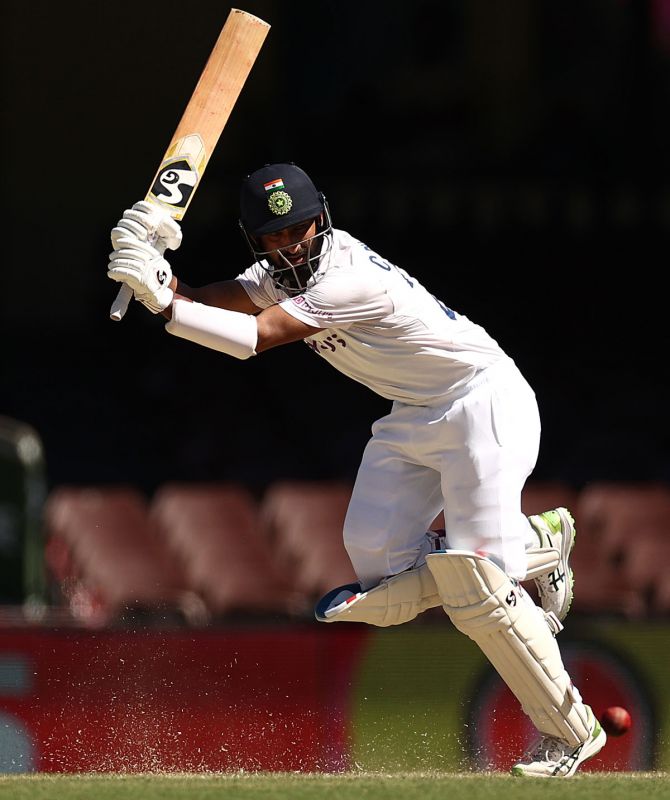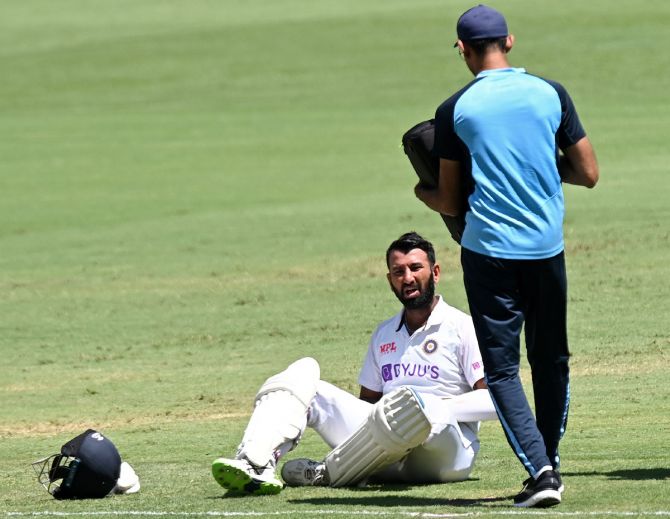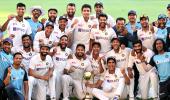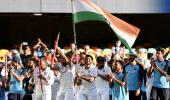'I couldn't even hold my bat, but I still wanted to carry on batting despite the amount of pain because me staying there was important for the team.'
'It was tough, but if you want to win matches for your team, if you want to contribute, then you will have to overcome such challenges.'

Australia tried everything, they even struck him a few blows, but they just couldn't get the better of Cheteshwar Pujara.
The India No 3 withstood a barrage of bouncers from the Australian pace battery and even though he was struck on the body a few times on the final day, he never gave up as he engineered one of the greatest triumphs in the history of Indian Test cricket.
Not wanting to risk getting hit on the gloves in trying to keep out the bouncers, Pujara showed great courage by putting his body on the line.
In fact, a painful blow on the already injured finger had left him in considerable pain as he even struggled to hold the bat, but he battled hard to keep the Aussies at bay with his gutsy half-century.
Pujara defied the Australian bowlers for more than five hours, scoring 56 from 211 balls, as he laid the foundation for India's famous win.
His solid approach gave the other batsmen confidence to score freely from the other end, including Shubman Gill (91) and Rishabh Pant (89).
The Saurashtra right-hander was also instrumental in helping India pull of a sensational draw in the third Test in Melbourne, with two half-centuries, as the visitors batted out the entire final day.
Pujara spoke to Rediff.com's Harish Kotian about how despite being sustaining a few painful blows on the body, he batted out of skin to lay the foundation for one of India's greatest Test triumphs.
The first of a multi-part interview:
Was it the toughest series ever that you have been part of so far? It was a tough challenging series for the Indian team especially as we kept losing key senior players right through while Australia were at full strength...
Yes, this was one of the toughest series that I have been part of without any doubt.
I have been part of many challenging series against Australia in the past, including the last ( 2018-2019) series which we won, which was also not at all easy.
We beat Australia in India in 2017, that is also one of the toughest series I have been part of.
So victories never come easy against the Australian team, they are one of the top teams in the world, so it is always challenging, it is never easy.
As far as the Indian team was concerned, their performance was similar to that of a boxer... the more punches that Australia threw at India, they kept coming back stronger.
How did the team manage to make an unbelievable comeback after the 36 all out in the first Test despite so many injuries woes right through the series?
Losing the first Test after getting bowled out for 36, it was very tough to digest for all us. And all of us spoke that it is just one of those games, it was just an hour-and-a- half's time when we lost the Test match.
All the guys showed a lot of character, we believed that we could turn things around from that point onwards.
Also, the fact that it was going to be a different ball game from the second Test onwards. The pink ball is a different scenario altogether, the way it moves and even off the pitch it takes time to get used to the pink ball.
We were very determined to get things right, we have always done well with the red ball, the guys showed a lot of character and everyone came together as a team.
Everyone contributed at some point or the other team, the younger guys also contributed at crucial junctures, so that was the biggest positive for us.
Did it help that you guys were in quarantine away from the outside world which helped you bond together and not worry about the outside world?
In the first two games, we were allowed to go outside to restaurants and all, so we were still moving around. But in the last two games, we were under hard quarantine when we were not allowed to step outside the team hotel.
And when you are in quarantine you end up spending a lot of time with your team-mates so that does help somewhere when it comes to team bonding.
After winning the Test series, you said in an Instagram post that you were 'overcome with emotion and filled with pride. Moments like these make the countless hours of toil and practice worth it'.
How much did this victory mean to you personally?
It mean a lot because we were under put under pressure, we were playing away from home. Gabba was their fortress, they had an excellent record at that venue for the last so many years. I feel it was really special to win the series in Gabba and to make such a comeback in the series wasn't easy.
You had a difficult start with not many runs in the first two games but came back strongly with three fifties in the last four innings, including the crucial 56 on the final day in Brisbane.
Was it difficult to get going initially as you were playing competitive cricket after a gap of nearly nine months?
The tough part of me was that I was coming out of lockdown.
Most of the players, except for a couple, had played in the IPL so they had match practice. It is never easy when you are not playing too many practice games or first class games and going into a tough tour like Australia.
At the same time, I was working a lot on my game, I was working hard on my batting, but you always need some match practice.
In the first couple of games, I took time to find my rhythm, to get my concentration. At the same time Australia had a good plan in place for me, they knew what was expected of me, they did a lot of study of my game and came up with plans accordingly.
So to break their game plan, I needed some time and it happened little later in the Test series (in the final two Tests) and I am happy that it happened at the right time.
Yes one of the plans, Australia had for you this time around by trying to shut out the singles and build pressure on you. How did you work around that?
Their game plan, their line of attack and everything was different, so I had to be patient and I had to take my time. They were bowling good lengths, they were not bowling too many loose deliveries.
When you are well-set or if you are in rhythm and if you get a loose delivery you put it away, but in the first two Test matches I was missing out a few loose deliveries. So I had to counter their plans, which I managed to do.
Overall, if I look back at the series now, I am pretty happy with the way things went.

You took a lot of body blows during the final day in Brisbane. How difficult was it batting through the pain?
It wasn't easy when you keep hitting on your body, but the most important thing for me was that I knew if I hang around, if I stay at the crease they will be under a lot of pressure.
So I wanted to make sure that I don't give my wicket away. There was variable bounce on the pitch, if you look at it, the balls which were hitting me on my body were from one end, maybe it was off the crack or maybe it was off the variable bounce, so it wasn't easy to judge the bounce that day.
The only way I could have survived was to take the blows on my body rather look to get on top of the ball which could hit my gloves and go anywhere -- either short leg, gully or leg gully, anywhere basically.
So I thought that I would take it on my body.
How many painkillers did you take while batting?
I don't take any painkillers. I am someone who doesn't like to take painkillers and if I can bear the pain, I will do it.
How difficult was it to bear the pain without any painkillers?
It was really tough when I got hit on my finger, that was the second time I was hit there.
I got hit on the same finger which I had been hit earlier in the tour, on the fifth day.
That was the most painful blow for me, I felt like I had broken my finger but I decide to continue batting despite the pain.
It wasn't the same after that because I couldn't even hold my bat, but I still wanted to carry on batting despite the amount of pain because me staying there was important for the team.
It was tough, but if you want to win matches for your team, if you want to contribute, then you will have to overcome such challenges.










